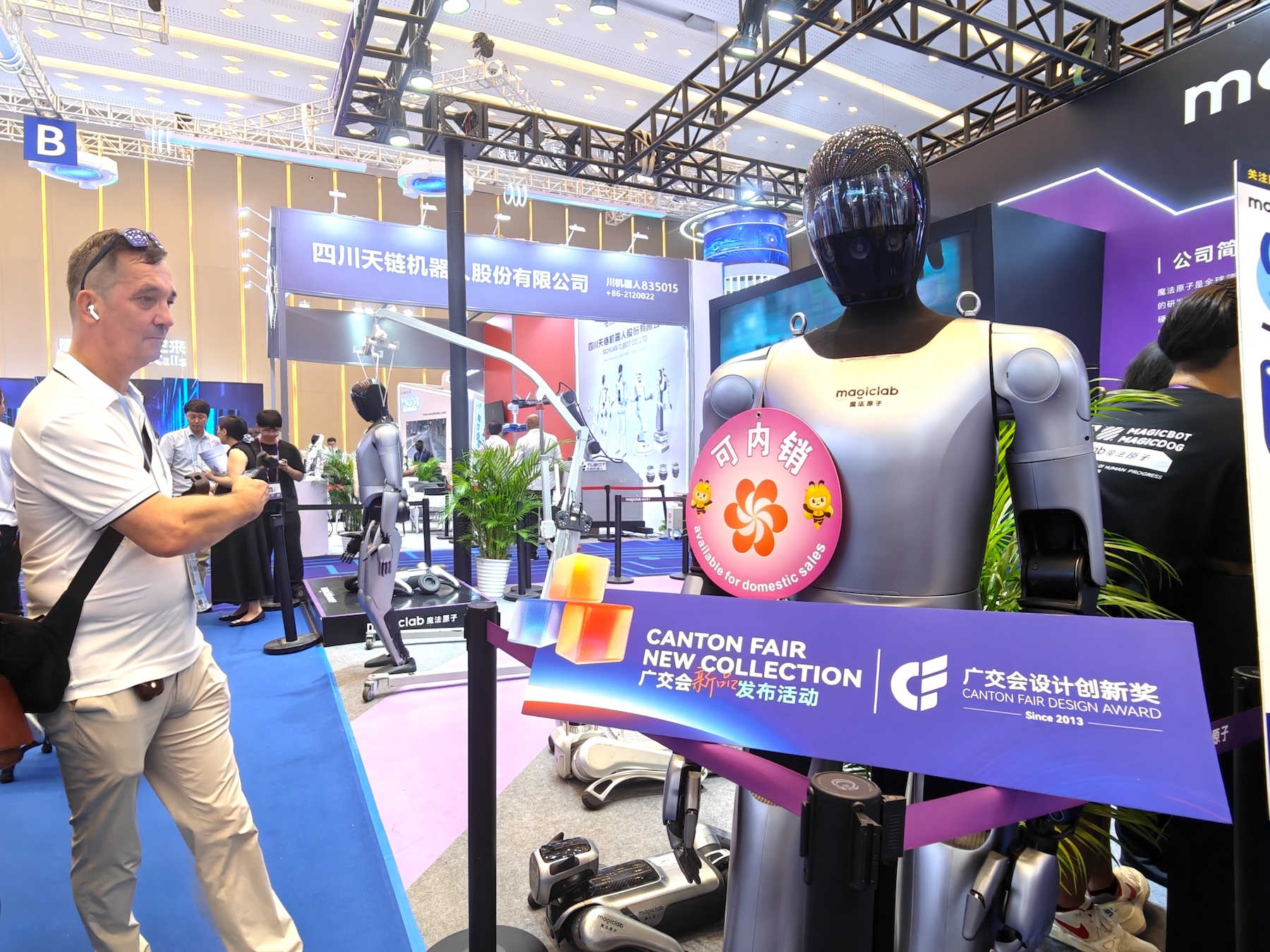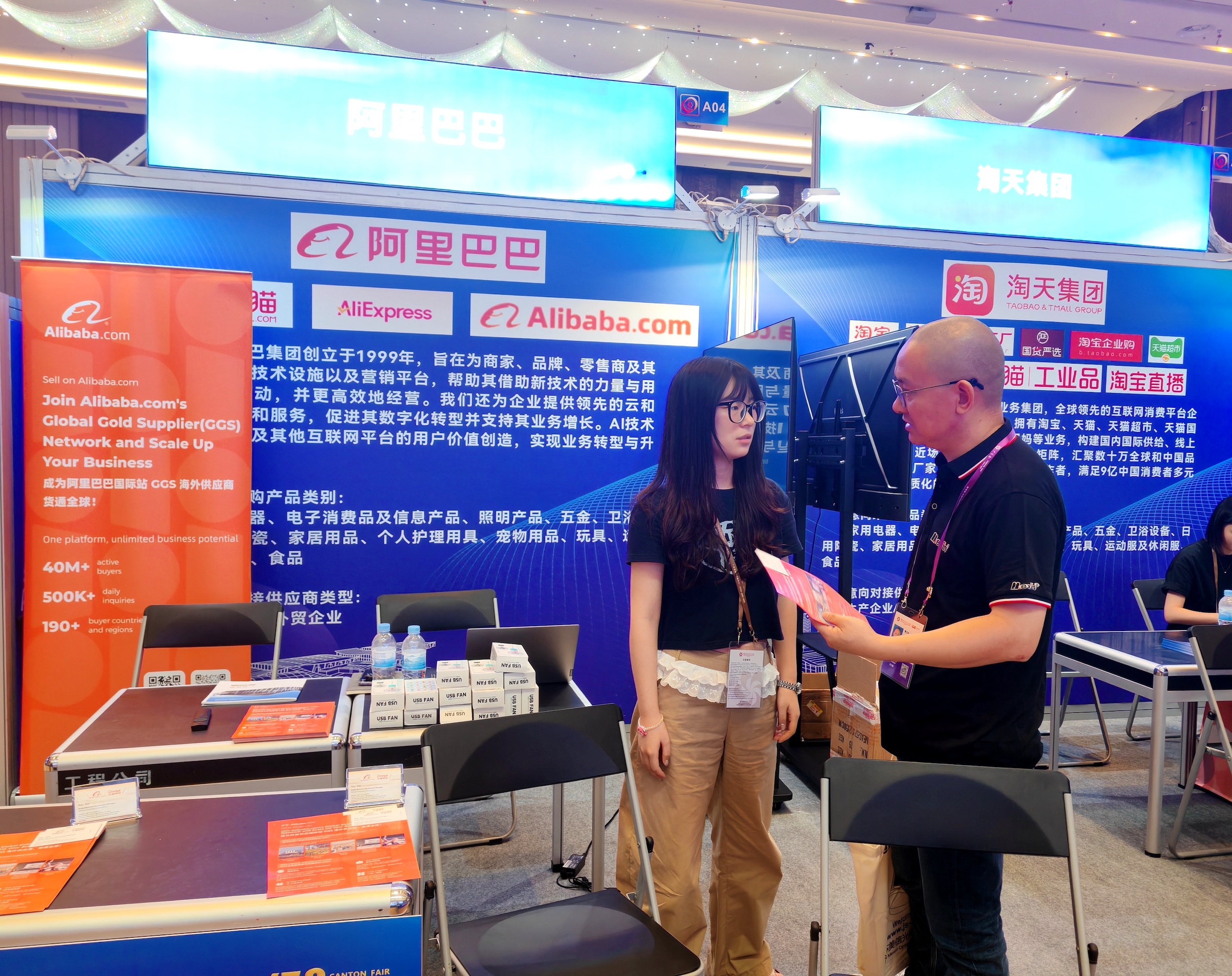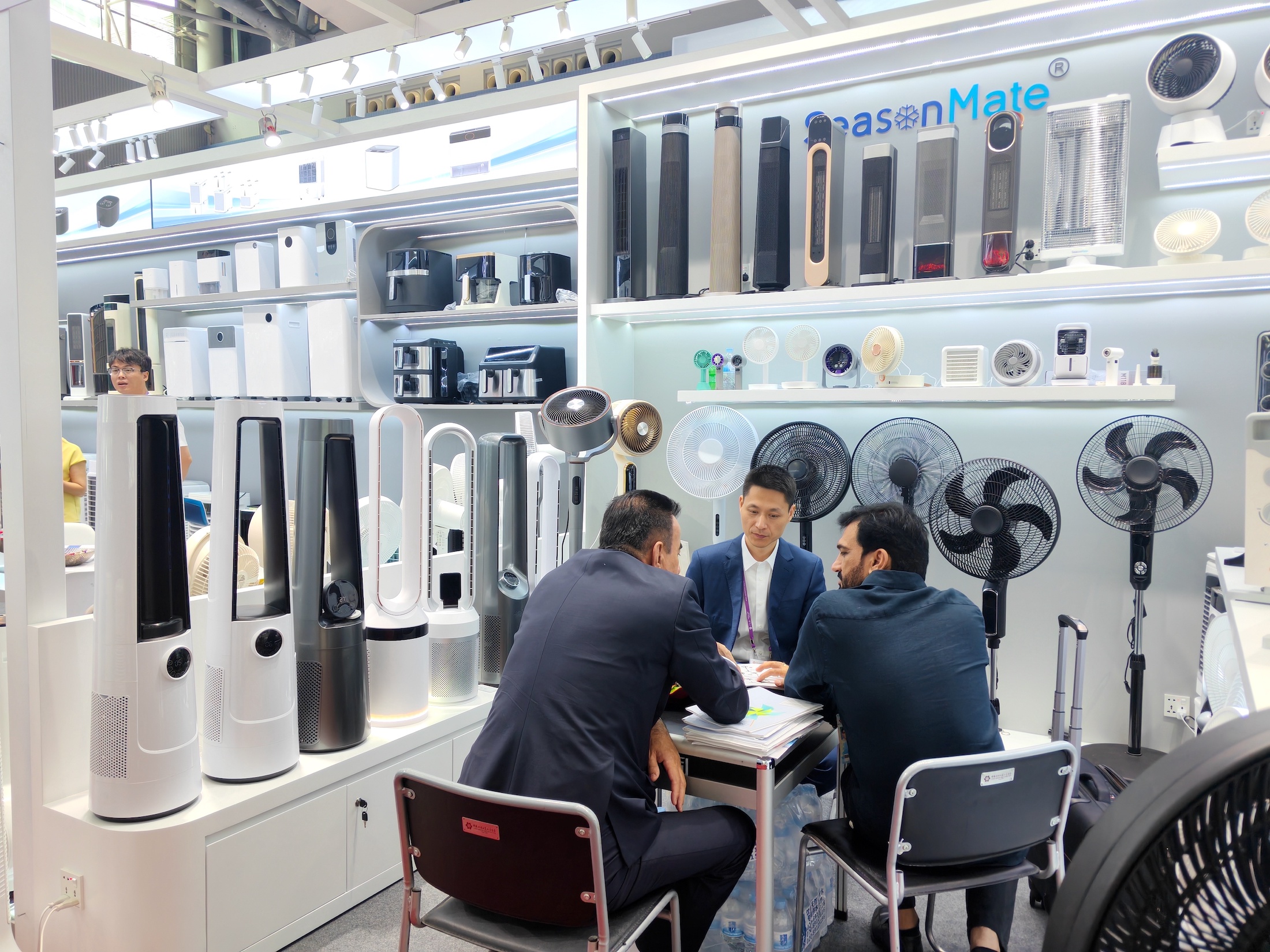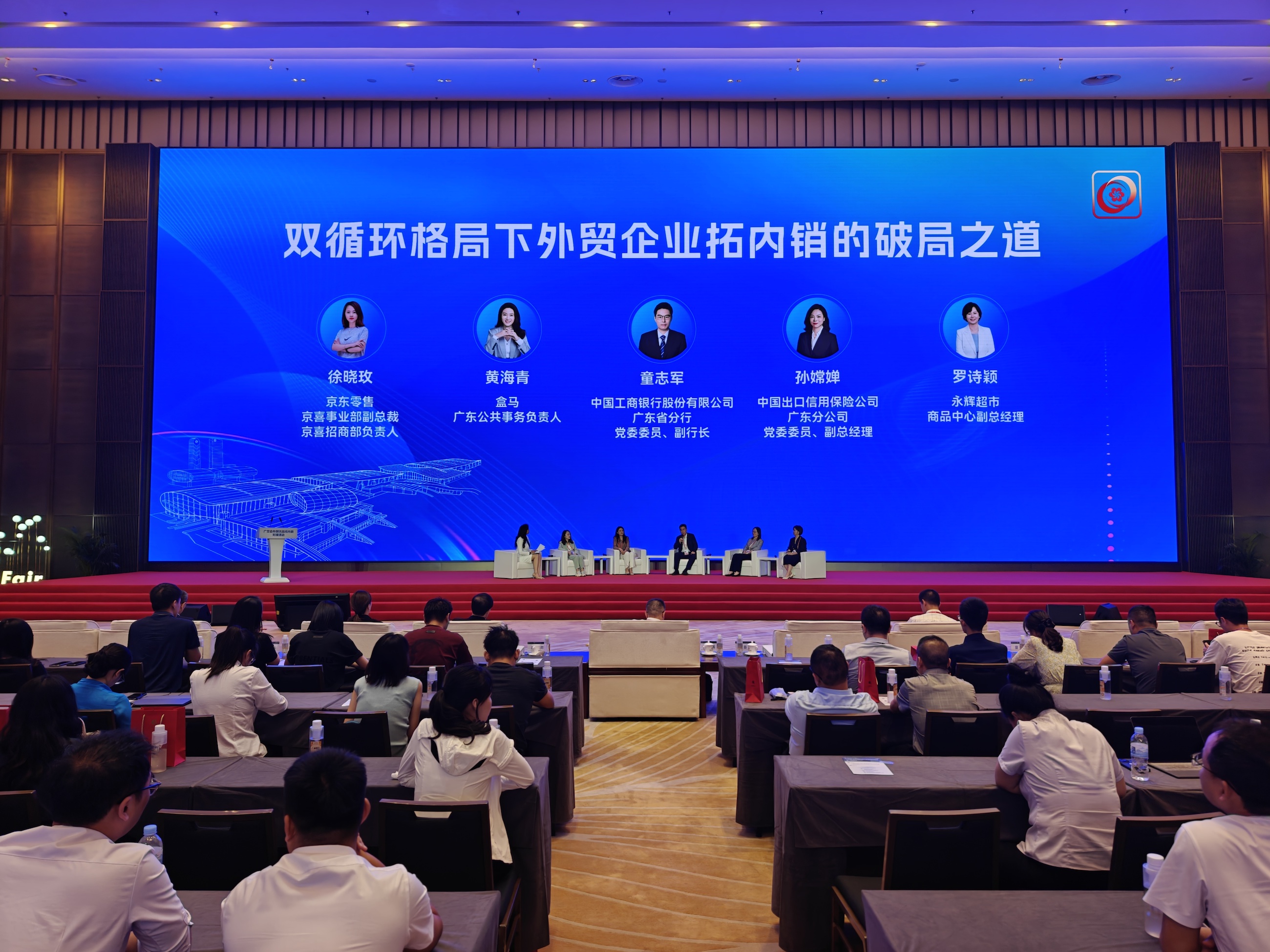




- BRNN
- BRI News
- BRNN News
- Database
Official Documents Polices and Regulations
Inter-government Documents International Cooperation BRI Countries
Business Guide Economic Data BRI Data
Trade
Investment Projects Latest projects
Cases - Content Pool
Walking through the exhibition hall of the 138th China Import and Export Fair, or the Canton Fair, held in Guangzhou, south China's Guangdong Province, booths displaying the sign "Available for Domestic Sales" draw the attention of buyers.
According to data, more than 24,000 exhibitors, about 77 percent of all participating companies, have marked their products as available for domestic sales at the fair.

A robotic product holds a sign that reads "Available for Domestic Sales" at the 138th China Import and Export Fair, or the Canton Fair, held in Guangzhou, south China's Guangdong Province, on Oct. 15, 2025. (People's Daily Online/Wang Yadie)
On Oct. 16, the Canton Fair hosted its first-ever matchmaking event aimed at bringing high-quality exported products to the domestic market.
Tang Shengwu, an exhibitor from central China's Hubei Province, moved through the venue, promoting multimedia interfaces made by his company.
Tang's company mainly focuses on manufacturing, handling foreign trade through its own B2B channels. But when it comes to the domestic market, it's still a novice. Tang said he hopes to find the right platforms to showcase his products and meet potential clients to negotiate prices on the spot.
Cai Youkai is general manager of Letu Trade Co., Ltd. in Chenghai district, Shantou city, Guangdong. His company has specialized in domestic trade for more than two decades and only started expanding into export markets in recent years.
Attending the event as a buyer, Cai shared some advice for exporters hoping to enter the domestic market.
"If imitation is a concern, securing patents is essential. Selling domestically demands longer-term and more rigorous after-sales support. Pricing should not be driven by novelty alone and the key is having genuinely unique technology," Cai said.
Amid growing uncertainties in the global economy, many export-oriented companies have started to feel the risks of putting all their eggs in one basket.
A representative from Ningbo Cixi Import & Export Holdings Co., Ltd. revealed that the company officially launched its own brands on Chinese e-commerce platforms three years ago.
"Since domestic and international standards differ, we take those differences into account right from the product design stage," the representative said.

Foreign buyers visit the booth of Ningbo Cixi Import & Export Holdings Co., Ltd. at the 138th China Import and Export Fair, or the Canton Fair, held in Guangzhou, south China's Guangdong Province, on Oct. 16, 2025. (People's Daily Online/Ning Yuying)
Wang Zhiyuan, deputy director of the investment attraction and business expansion department at Jingxi, the community group-buying platform of Chinese e-commerce giant JD.com, said export-oriented companies face challenges when attempting to transition to the domestic market.
"First, rebuilding brand recognition is challenging, as many products are high-quality yet largely unknown to domestic consumers. Second, companies often lack familiarity with distribution channels and have limited understanding of China's e-commerce ecosystem and consumer preferences. Third, cost control can be difficult, since firms may not fully grasp domestic pricing structures and fulfillment rules, leading to higher overall expenses," he said.

A representative of a protective equipment company from Nantong, east China's Jiangsu Province, communicates with a buyer at a matchmaking event aimed at bringing high-quality exported products to the domestic market at the 138th China Import and Export Fair, or the Canton Fair, held in Guangzhou, south China's Guangdong Province, on Oct. 16, 2025. (People's Daily Online/Ning Yuying)
To help overcome these hurdles, the Canton Fair has partnered with major platforms to bridge the gap for companies.
At the matchmaking event, Huang Haiqing, head of public affairs at Freshippo Guangdong, shared the story of a company shifting from the U.S. market to the domestic market. Freshippo is Alibaba Group's grocery arm.
The company had long produced towels and bathrobes for the U.S. market, boasting excellent quality but little understanding of Chinese consumers.
"By leveraging digital ordering, technology, and deep insights into consumer behavior, we helped the company zero in on what domestic buyers really want—soft, cool, and quick-drying products. The new line flew off the shelves," Huang said.
Integrating domestic and foreign trade also relies on policy design. At the same event, Li Chunjiang from the State Administration for Market Regulation introduced a series of policies, including establishing green channels to avoid repetitive testing and certification, and reducing mandatory product certification times from an average of 30 working days to as few as seven. These measures are aimed at cutting institutional transaction costs for companies.
Tong Zhijun, vice president of the Guangdong provincial branch of the Industrial and Commercial Bank of China (ICBC), said the bank has introduced a financial product tailored for participating companies at the Canton Fair. Nearly 10 billion yuan (about $1.4 billion) has already been disbursed.

Representatives from finance and insurance sectors offer professional insights on supporting services, and representatives from retail chains and e-commerce platforms share advice on market expansion at a matchmaking event aimed at bringing high-quality exported products to the domestic market at the 138th China Import and Export Fair, or the Canton Fair, held in Guangzhou, south China's Guangdong Province, on Oct. 16, 2025. (People's Daily Online/Wang Yadie)

Tel:86-10-65363107, 86-10-65368220, 86-10-65363106